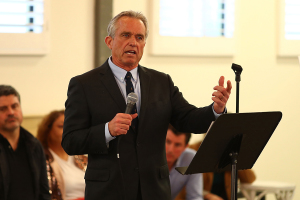Eric Metaxas' new book 'Religionless Christianity' warns hour 'extremely late' for American Church to resist evil

Bestselling author Eric Metaxas is warning American Christians in his new book that the hour is "extremely late" for them to stand up against the rising evil in their country.
Religionless Christianity: God's Answer to Evil, which was published last week, echoes themes the Dietrich Bonhoeffer biographer has written about for more than a decade in his previous books, he explained during an interview with The Christian Post.

As he recounted in his bestselling 2010 biography Bonhoeffer: Pastor, Martyr, Prophet, Spy, Metaxas noted that while the German pastor did his best to resist the rise of Nazism, his warnings to his countrymen about the evils of National Socialism ultimately fell on deaf ears.
Accused of being involved in a plot to assassinate Adolf Hitler, Bonhoeffer was ultimately martyred at the Flossenbürg concentration camp in April 1945 as the Nazi government was imploding and Germany was being conquered.
Citing Bonhoeffer's legacy, Metaxas presents Germany as a cautionary tale for the church in the United States and other historically Christian countries that fail to realize how swiftly evil can overtake them if they fail to vigilantly resist it.
The title of Metaxas' newest book emerged from a phrase Bonhoeffer used in a 1944 letter he wrote to a friend from prison explaining why he believed the Church in Germany failed to stem the rise of a demonic regime. He argues that the "religionless Christianity" for which Bonhoeffer advocated — defined as a genuine faith stripped of the secularized impulse that relegates Christ to the merely theological — is the only means by which the American church can be restored.
'Religious idols'
Metaxas explained to CP that he felt compelled to write Religionless Christianity following the favorable reception to his 2022 book Letter to the American Church, which argued there are sobering parallels between the American Church today and the passivity of the German Church that allowed Hitler to rise in the 1930s.
"The premise that I put forth in Letter to the American Church is that it's possible for the Church to get things dramatically wrong; to be merely religious, when God is calling us to a full-throated expression of our faith in the public square — politically, in every way, in the way the German church failed in the '30s," he said.
"I wanted to go back to how the German Christians got it wrong by enabling the Nazis and evil to take over, and I wanted to look at what are some of the religious idols they set up — and we've set up — in place of worshiping God," he added.
Metaxas devotes a chapter in the book to pinpointing some of the "idols" that he warns are especially pernicious because they seem religious and are, therefore, better able to creep into the Christian heart.
One such idol, he said, is the "idol of purity," which convinces some Christians that they would be sullying themselves if they get involved in the political process, he writes.
Another is the idol of "fatalism," which he said can lead some Christians to believe that because God is sovereign, they need not do all in their power to resist the evil that often manifests in a political way.
'The hour is extremely late'
Metaxas offers a sobering view in Religionless Christianity of the spiritual crossroads where he believes Americans find themselves, arguing in the book's first pages that the U.S. is facing what he describes as "the third existential crisis of our history."
The first crisis Americans faced was the Revolution, which determined whether the nation would exist at all; the second was the Civil War, which decided if it would continue; the third is a profound moral crisis that Metaxas argues is "absolutely unprecedented in anybody's lifetime."
"None of us has ever faced anything like this, which is why I think so many are still asleep in the Church, because they don't understand the evilness of evil," Metaxas said. He added that many Americans mistakenly believe their society will continue more or less as it always has, not realizing that catastrophe could fall on the U.S. just as it has in many other nations throughout history.
Metaxas described such a complacent worldview as the belief that "things have pretty much always been the same, and things get better and worse; the pendulum swings back and forth, but we'll be fine."
"That is precisely what the German Church believed, which caused them to sit on their hands just long enough for evil to totally take over that nation," he said. "That's where we are today."
Speaking to CP in January about the documentary adaptation of his book Letter to the American Church, Metaxas noted how Germany was once "an amazingly civilized, wonderful society, tremendously Christian in many ways" until the Nazis gained power and destroyed it. The message of his new book reiterates the warning he believes Germany offers.
"The hour is extremely late," he said. "In 1933, when the Nazis took over, they moved with lightning speed. Bonhoeffer knew that by 1935, it was effectively over, because the Church did not stand up strongly enough against the evil of the Nazis in '33 and '34. They were effectively crushed."
Metaxas devotes an entire chapter in Religionless Christianity to the story of Martin Niemöller, a prominent German theologian and Lutheran pastor who was involved with the Confessing Church that resisted the Nazi regime.
Niemöller at first believed Hitler's government could coexist with the German Church, Metaxas explained.
During a personal encounter with the dictator, Niemöller ultimately realized that Hitler had no intention of cooperating with Christians who resisted his murderous agenda, and he narrowly avoided execution after being imprisoned in multiple concentration camps.
"He woke up five minutes too late," Metaxas said of Niemöller. "By the time he woke up, there was very little that could be done."
'The devil's term'
Metaxas advised Christians to leave churches that are cowering from the raging cultural and political battles, and also advised them not to be cowed into silence by those who would accuse them of "Christian nationalism" for caring about politics.
Metaxas believes that the increasingly broadening term is a demonic attempt to silence Christians who endeavor to fulfill the political duties he believes they should embrace, especially at a time when the U.S. faces ruinous levels of corruption, and the Left is pushing an atheistic, Marxist worldview with the force of federal and state and local governments.
"Christian nationalism is nothing but the devil's term for actual Christians living out their faith," he said. "And so, it's an attempt to demonize Christians living out their faith. That's all it is."
"That's how little courage we have," he continued. "We've been so spoiled in America that we haven't had to fight."
He advocated "laughing in the face" of those who would attempt to slap the Christian nationalist label on anyone who advocates for God's purposes in the public square.
"We need to understand that these are demonic forces that are trying to silence the voice of God's people," he said. "It's nothing less than that. And so anytime anybody refers to the boogeyman of Christian nationalism, just laugh at them and ignore them, because all they're trying to do is create a term to silence God's people."
Metaxas, who also wrote a biography of British abolitionist William Wilberforce in 2007, said those who led the charge against slavery in the Western world faced similar pushback.
"The forces of Hell came against him," he said of Wilberforce, adding that even though what he advocated for is now universally accepted, the issue led to political upheaval in the British Empire and a bloody Civil War in the U.S.
"Sometimes Christians are called to fight," Metaxas said. "Not in a military way today, but the fighting spirit, to say that we're advocating God's purposes in history. This is a sacred thing, and it is a great privilege that we get to do this, and we're not going to let somebody calling us names silence us."
Jon Brown is a reporter for The Christian Post. Send news tips to jon.brown@christianpost.com




























